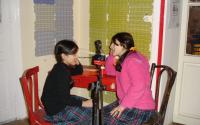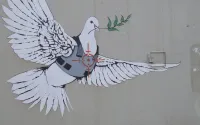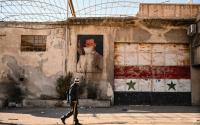| Airdrops of food and medical aid described as of 'negligible value' and 'potentially dangerous' |
Press release, Islamabad, Oct 8, 2001: The international medical aid agency Médecins Sans Frontières (MSF), which has been working in Afghanistan since 1979, today cast doubt on the so-called 'humanitarian airdrops' by US and British military forces, which have accompanied the military strikes against Afghanistan over the last 24-hours. Such action does not answer the needs of the Afghan people and is likely to undermine attempts to deliver substantial aid to the most vulnerable.MSF's Dr Jean-Hervé Bradol, speaking from Pakistan, explained that the so-called 'humanitarian' action, was in fact a purely propaganda tool, of little real value to the Afghan people. Moreover, the deliberate adoption by the military of a 'humanitarian' purpose, was likely to cause real problems for truly independent non-governmental aid organisations who are less likely to be perceived as impartial actors in the future. "How will the Afghan population know in the future if an offer of humanitarian aid does not hide a military operation?" questions Dr Bradol. "We have seen many times before, for example in Somalia, the problems caused for both the vulnerable population and for aid agencies when the military try to both fight a war and deliver aid at the same time."Dr Bradol explained that the real impact of the much-vaunted 37,500 single day rations on the burgeoning nutritional crisis within Afghanistan was likely to be minimal. "What is needed is large scale convoys of basic foodstuffs, rather than single meals designed for soldiers. Until yesterday the UN and aid agencies such as ourselves were still able to get some food convoys into Afghanistan. Due to the airstrikes the UN have stopped all convoys, and we will find delivering aid also much more difficult."Doctors from MSF also expressed concern at the reported airdropping of medical supplies. "Medical relief is not the same as dropping medicines by plane. Unless they are administered by qualified medical staff, medicines can actually do more harm than good", said Dr Bradol. "Dropping a few cases of drugs and food in the middle of the night during air raids, without knowing who is going to collect them, is virtually useless and may even be dangerous".Médecins Sans Frontières therefore rejects the idea of a humanitarian coalition alongside the military coalition, as requested by President Bush and Prime Minister Blair, and calls for the imperative necessity of independent humanitarian action. |
| Related Links Over one million potential refugees are thought to be on the move in Afghanistan, heading to the neighbouring countries. A closer look at MSF in Afghanistan and Central Asia |
MSF rejects link of humanitarian & military action
20 Kasım 2001
-
Aa
+
a
a
a






